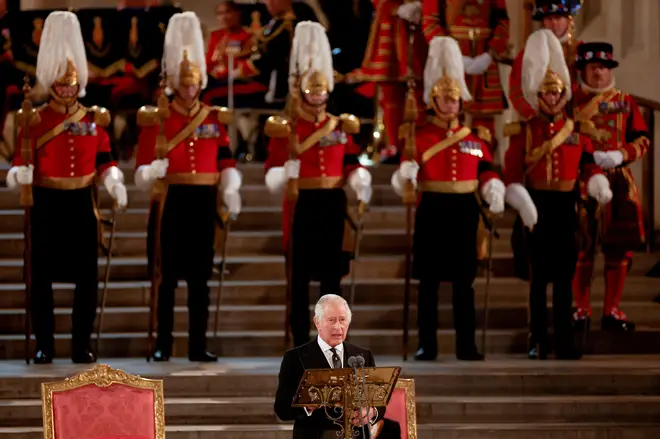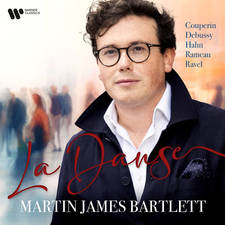‘God Save the King’: how the national anthem has changed for a new monarch
12 September 2022, 17:30 | Updated: 19 September 2022, 08:59

Charles appears moved as MPs sing God Save The King in Westminster Hall
For the first time in over 70 years, a centuries-old anthem has reverted to its ‘original’ version following the accession of King Charles III.
Following the accession of Charles III, ‘God Save the King’ was sung in public as the national and royal anthem of the United Kingdom and many Commonwealth nations, for the first time in over 70 years.
It was heard at a memorial service for the late, beloved Queen Elizabeth II in St Paul’s Cathedral on Friday 9 September 2022, and once more the following day as Charles III was proclaimed King in front of the Accession Council at St James’s Palace in London.
‘God Save the Queen’, the iteration of the British national anthem so familiar to audiences in concert halls, cathedrals, and sports stadiums across the country, will likely never be heard again at a public occasion in any of our lifetimes.
As the national anthem reverts to its original version, here is the story of how ‘God Save the King’ first came to be.
Read more: What are the lyrics to Britain’s national anthem and who composed it?

‘God Save the King’, sung by soprano Alexandra Stevenson
When was ‘God Save the King’ first adopted, and who wrote it?
‘God Save the King’ is one of the oldest national anthems in the world, first performed during the reign of King George II in the 18th century. The composer and writer are anonymous, and both the text and tune may date back to the 17th century.
In September 1745 Prince Charles Edward Stuart, known in his lifetime both as Bonnie Prince Charlie, and as ‘the Young Pretender’ to the British throne, defeated the British army in battle near Edinburgh. After news of the defeat reached London, the leader of the band at the Theatre Royal, Drury Lane arranged ‘God Save the King’ for an encore after a play one night.
The performance was a roaring success, and the theatre company settled on repeating it every night. Other theatres soon cottoned on, and so the custom of greeting monarchs with the anthem was born.
The identity of the anthem’s anonymous author has been the subject of much speculation, with some tracing the melody back to a tune by Elizabethan composer and organist John Bull, and others matching it to a tune by Purcell.
The song’s text, however, has been around for much longer. In The Oxford Companion to Music in 1938, Percy Scholes writes that ‘God Save the King’ was used as a watchword (a short phrase, communicated to a naval guard) in the Royal Navy since the year 1544, with ‘Long to reign over us’ as the counterword (the reflex-like phrase communicated back).
At the beginning of the 19th century, ‘God Save the King’ started to be described as a national anthem.

When did the anthem change to ‘God Save the Queen’?
According to Debrett’s, a leading guide on British etiquette who spoke to the LA Times, Britain’s national anthem was adapted to ‘God Save the Queen’ for Queen Victoria, who reigned from 1837 until her death in 1900.
In 1952, the anthem’s text once again referred to the ‘Queen’ as a young Elizabeth II was proclaimed Queen upon the untimely death of her father, George VI.
Following the death of Her Majesty Queen Elizabeth II, crowds gathered outside Buckingham Palace to sing both ‘God Save the Queen’ in memory of Her Majesty, and ‘God Save the King’ for Charles III.
Read more: British orchestras and choirs pay tribute to the late Queen Elizabeth II through music

God Save the Queen in St George’s Chapel, Windsor Castle
Where is ‘God Save the King’ used?
‘God Save the King’ had not been sung publicly since 1952 when Elizabeth’s father, George VI, died.
From now on, it will be heard as the national anthem of the United Kingdom and the Commonwealth, at all appropriate royal occasions and sporting events.
Around 140 composers including Beethoven, Haydn and Brahms have used the melody, widely known as an expression of loyalty and patriotic sentiment, in their own compositions.























